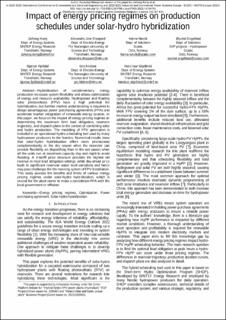Impact of energy pricing regimes on production schedules under solar-hydro hybridization
Kong, Jiehong; Sheppard, Alexandra Jane; Nøvik, Hanne; Engelstad, Øyvind; Fjelldal, Bjørnar; Klæboe, Gro; Skjelbred, Hans Ivar
Chapter, Peer reviewed
Accepted version
Permanent lenke
https://hdl.handle.net/11250/3113030Utgivelsesdato
2023Metadata
Vis full innførselSamlinger
- Publikasjoner fra CRIStin - SINTEF Energi [1614]
- SINTEF Energi [1731]
Originalversjon
2023 IEEE International Conference on Environment and Electrical Engineering and 2023 IEEE Industrial and Commercial Power Systems Europe - EEEIC / I&CPS EuropeSammendrag
Hybridization of complementary energy production increases system flexibility and allows optimization of energy and resource availability. Hydropower and floating solar photovoltaics (FPV) have a high potential for hybridization, but further market understanding is required to design advantageous power purchasing agreements (PPA) and accelerate market integration of renewable energy sources. In this paper, we focus on the impact of energy pricing regimes on determining the maximum firm load obligation, reservoir trajectory, and dispatch plans in the context of combining solar and hydro production. The modeling of FPV generation is included in an operational hydro-scheduling tool used by many hydropower producers in the Nordics. Numerical results show that solar-hydro hybridization offers more pronounced complementarity in the dry season when the reservoir can provide flexibility on dispatching than in the wet season when all the units run at maximum capacity day and night to avoid flooding. A 3-tariff price structure provides the highest net revenue in most load obligation settings, while day-ahead price leads to significant reservoir water level variations and hence may pose challenges for the mooring system of FPV installation. This study assesses the benefits and limits of various energy pricing regimes under solar-hydro hybridization, which is crucial for the plant owner to make a considerate PPA with the local government or off taker. Impact of energy pricing regimes on production schedules under solar-hydro hybridization

